Celebrating SA’s ‘Mr Football’
South Australian football has lost an icon with the sudden death of Neil Kerley. Michelangelo Rucci looks back at the legendary life and times of “Knuckles”.
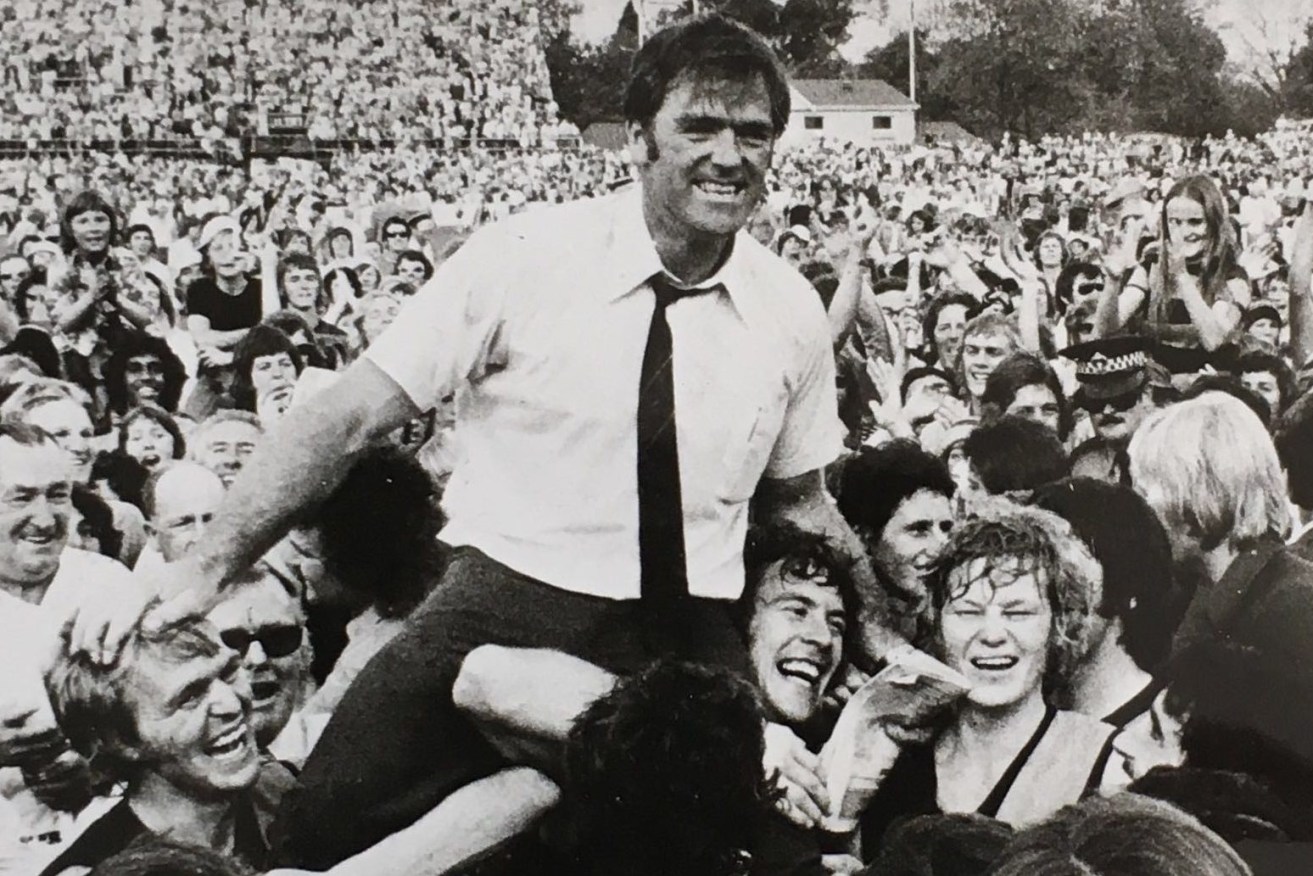
Neil Kerley is chaired from the ground after coaching Glenelg to its drought-breaking 1973 Grand Final win against North Adelaide. Photo: SANFL
South Australian football has lost its king. And it will never again see such a commanding figure as Donald Neil Kerley, the man universally known as “Knuckles”.
Kerley died on Wednesday evening while driving to his River Murray retreat at Walker’s Flat. He was 88.
“King Kerley” was South Australia’s Mr Football, the mirror image of his much-loved Victorian counterpart and fellow Australian Football Hall of Fame member Ted Whitten. Together they defined the rivalry between South Australia and the Big V of Victoria for decades.
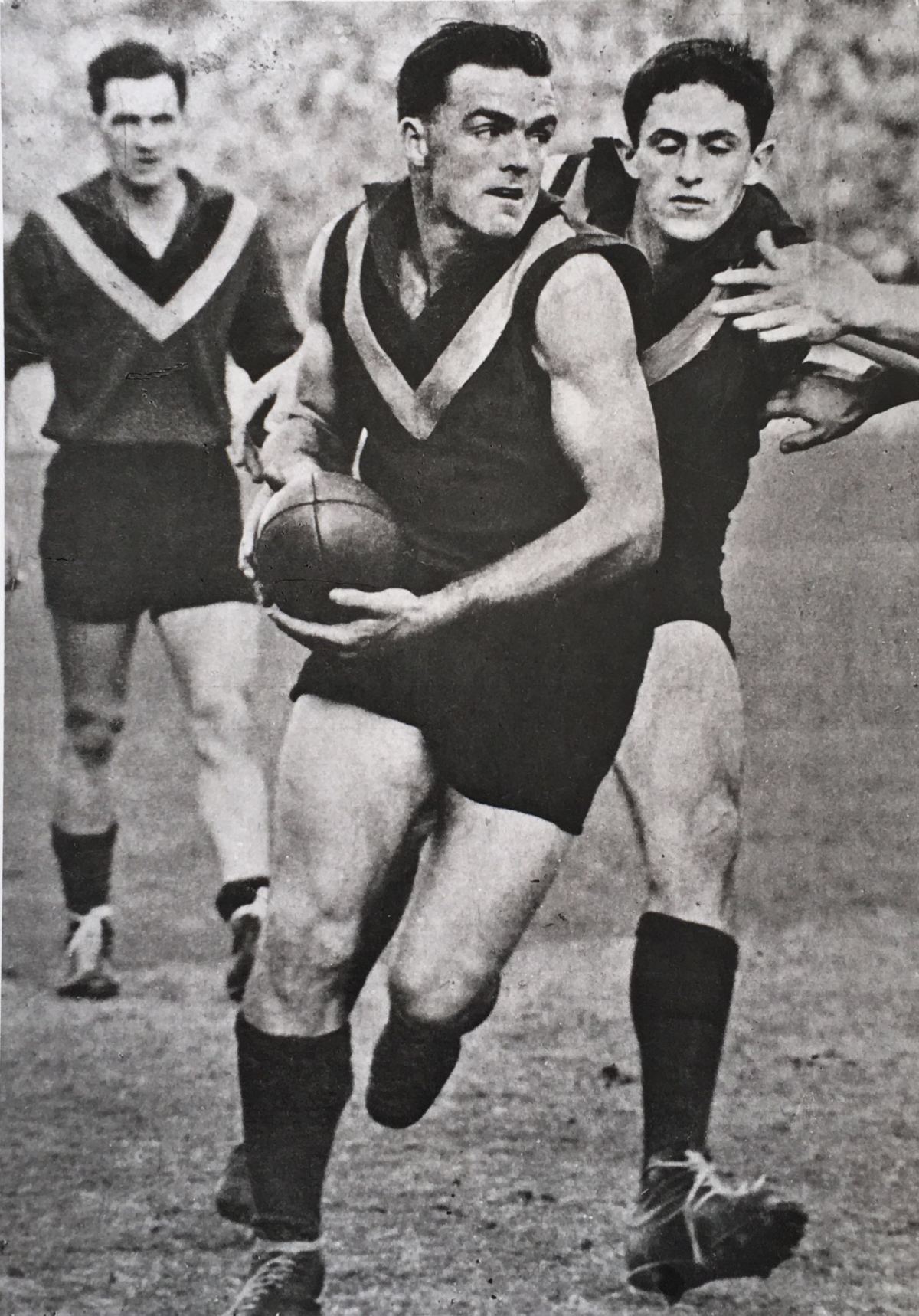
Neil Kerley represents SA in the State of Origin against Victoria. Photo: SANFL
But unlike anyone else in Australian football, Kerley was more than a legend of one club. Whitten was devoted to Footscray in the VFL. Kerley touched five of the 10 league clubs in the SANFL across six decades as a player and as a coach – his original club West Adelaide, South Adelaide, Glenelg, West Torrens and Central District – and he put down the foundations of South Australia’s first AFL entry, Adelaide.
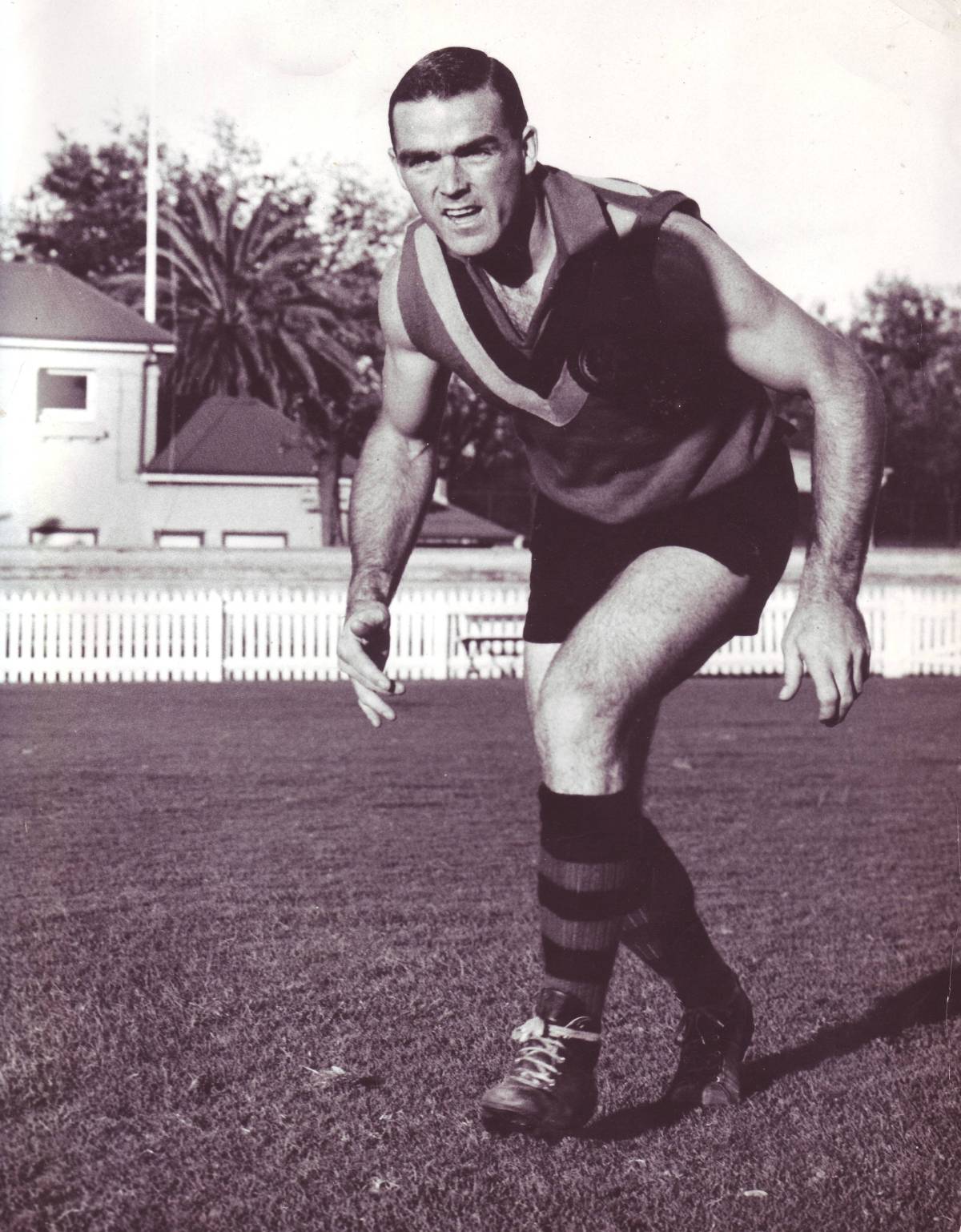
Keil Kerley wearing State of Origin strip. Photo: SANFL
Kerley’s mark on South Australian football extended to the country leagues. He started at Barmera in the Riverland. He then led a premiership team at Woomera in 1953 as 19-year-old captain-coach, before taking North Whyalla to two premierships in 1954 and 1955.
Kerley played in the famous South Australian team that broke a four-decade drought at the MCG, beating Victoria at Australian football’s cradle in 1963. He captained the State team six times. He coached South Australia. He was chairman of selectors. He was the man who stood up to Whitten, particularly during the extraordinary State of Origin battles between South Australia and Victoria of the 1980s and early 1990s.
Kerley spread himself across every platform during the traditional media era of television, radio and newspapers. He created headlines with his bold statements in print. He entertained with his antics on the panel shows that were must-watch television during the 1970s. He became the much-loved “boundary rider” when Channel Seven gave “Kerls” a national profile with the growth of the national AFL league during the 1990s.
No one has touched South Australian football in so many places with such power by his absorbing personality and his authority. And he was an A-list personality as a publican, league footballer, media celebrity and singer who in the early 1970s released a single, “I was Born Under a Wandering Star”, a Lee Marvin cover which summed up his football and his life. The short musical career – and the television antics – highlighted that Kerley could step away from being a serious footballer. He knew how to laugh.
Kerley’s mark on South Australia spread far beyond the game. Premier Peter Malinauskas noted: “South Australia has lost an icon. Australia has lost a football legend. He was a passionate and proud South Australian, the embodiment of State pride.”
Neil Kerley was born at Barmera on February 20, 1934. He grew up as a Norwood fan and he started his league football career at West Adelaide in 1952. He finished playing in 1969 at Glenelg with a 274-game record: 163 in two stints at West Adelaide, 56 as captain-coach at South Adelaide and 55 at Glenelg.
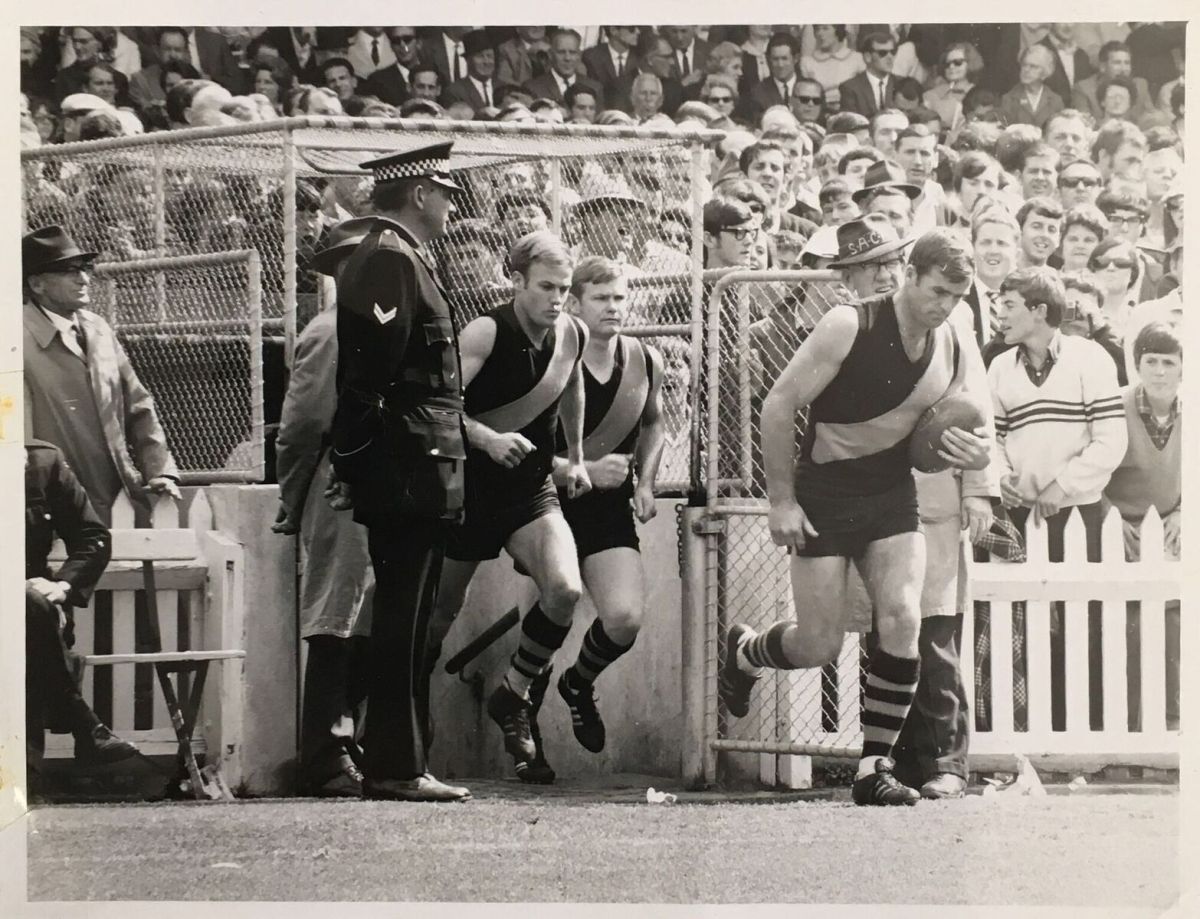
Neil Kerley leads Glenelg onto the ground. Photo: SANFL
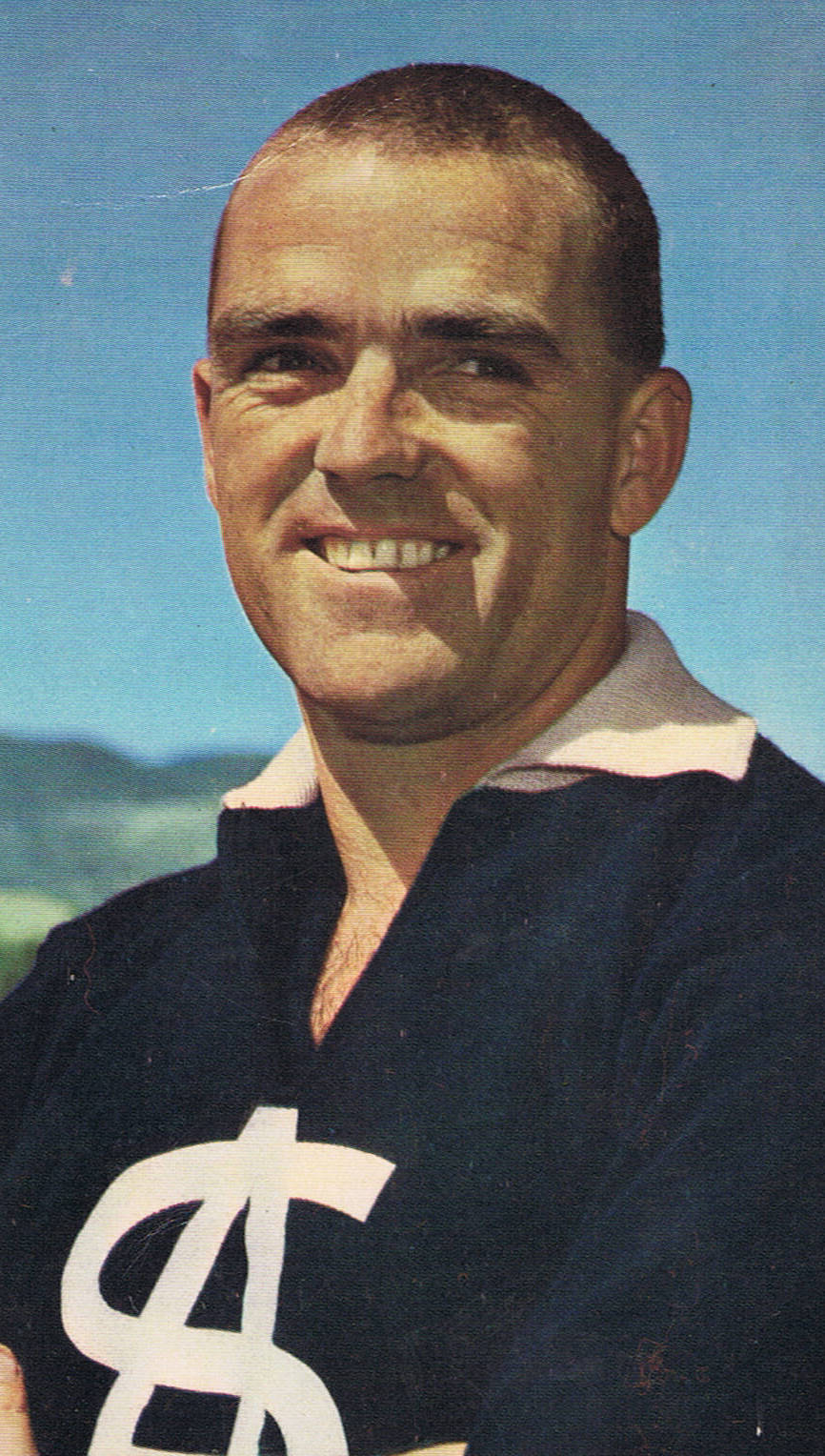
Kerley as a South Adelaide player. Photo: SANFL
As a player, Kerley defined his game with toughness (sometimes labelled as roughness). The legend of Kerley’s strongman image on the football field was once defined by cricketer David Hookes saying: ” ‘Kerls’ did all the things you’re not allowed to do any more”. His toughness was embodied in his distorted fingers that led to the “Knuckles” nickname.
His determination seemed to have no limit in demanding all he could physically muster, and a bravado that defied personal safety. He famously finished a game while playing the second half with a broken jaw, packed with chewing gum.
Kerley had learned about survival of the fittest in a tough, country upbringing after his father died when he was a boy. At 14, he left school to become a labourer.
His brilliance as a footballer should not be understated, considering his third placing in the 1961 Magarey Medal – the annual trophy to the SANFL’s fairest and most brilliant player, a trophy Kerley always noted “is not won but awarded by the umpires”. He won five best-and-fairest titles in club football; four at West Adelaide and one at Glenelg.
Kerley began building his coaching image during the era when Fos Williams at Port Adelaide and Jack Oatey at Sturt each won five consecutive SANFL premierships – Williams from 1954-1958 and Oatey from 1966-1970.
Kerley led long-suffering SANFL clubs from the wilderness to premiership glory. He guided West Adelaide, after all its painful losses in grand finals to Port Adelaide during the 1950s, to the 1961 premiership – and was sacked after losing the 1962 grand final. This prompted member rebellions at West Adelaide and town hall meetings demanding his reinstatement as coach and the sacking of the club’s board.
West Adelaide had to wait 22 years for another SANFL flag – under Kerley’s stewardship in 1983.
Kerley took South Adelaide from bottom in 1963 to the premiership in 1964. The Panthers have not won an SANFL league title since. Kerley gave Glenelg its second SANFL flag and ended a 39-year drought with an epic triumph against North Adelaide at Adelaide Oval in 1973.
That Glenelg side included the fresh-faced Peter Carey, who is today club president.
“I still remember that grand final to this day,” Carey said. “I was more worried about letting ‘Kerls’ down than worrying about the team or playing well. The esteem I had for Neil was enormous.
“I was so fortunate to have him as my coach. I loved playing for ‘Kerls’. But I am so disappointed that I never got to play alongside him. He was an incredible man. I was in awe of him as a youngster and I wanted to emulate him as a footballer. He was tough, uncompromising, he led by example – and he certainly was fun to be around. When ‘Kerls’ held court, there was no shortage of stories.”
Kerley’s story in South Australian football is like no other. Long live the memory of “King Kerley”.




